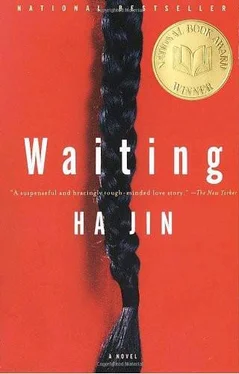"May I look at some of your books?" she asked.
"Of course, you're welcome."
She took a bite of the pear, which was juicy and fragrant and reminded her of a banana she had eaten many years ago. She began flicking through several books. They all carried the same woodcut plates behind the front covers, and some thick volumes had Lin's personal seal on their fore edges. She was impressed by his caring for the books and would have loved to see more, but she couldn't stay longer because she had a package to deliver to another doctor.
After that visit, she started to borrow books from Lin. The hospital had a small library, but its holdings were limited to the subjects of politics and medical science. The two dozen novels and plays it had once owned had been surrendered to the bonfires built by the Red Guards before the city hall two months ago. Strange to say, Lin's books remained intact. No one seemed to have reported him, and none of the hospital's revolutionaries had suggested confiscating Lin's books. Manna soon discovered that several officers were using Lin's library in secret; sometimes she had to wait for a novel to come back from another borrower.
She wasn't a serious reader and seldom read a book from cover to cover, but she was eager to see what Lin and his friends were reading, as though they had formed a clandestine club she was curious about.
On National Day, October i, she ran into Lin before the hospital's photo shop, which was run by an old crippled man. Lin asked her if she could help him make dust jackets for his books. He explained, "It's not safe to show their titles on the shelf. Everybody can see them. I've wrapped up half of them already."
"I'll come and help. You should've told me earlier," she said.
When she arrived at his dormitory that evening, Lin's roommates, Ming Chen and Jin Tian, were there, bent over a chessboard, playing a war game and drinking draft beer, which they poured from a plastic lysol can sitting on a desk. Ming Chen was an acupuncturist and Jin Tian an assistant surgeon, both trained by the hospital. Lin took out a thick roll of kraft paper, a pair of scissors, and a packet of adhesive tape. Together he and Manna began working on the books while his two roommates were battling noisily on the chessboard.
"Foul," Ming Chen shouted. "My colonel killed your captain." He had rancid breath, which Manna could smell three yards away.
"Come on," Jin Tian begged, "let me take back a move this once, all right? I let you do that just now when my land mine blew up your field marshal."
"Give me that piece, Bean Sprout." Ming Chen reached across the desk for Jin Tian's fist, which had grabbed the captain.
Dodging his opponent's hand, the spindly Jin Tian said, "Watch your mouth!"
"I watch your mother's ass."
"Knock it off, man! We have a lady comrade here."
"From now on no false move!"
"Okay."
Lin and Manna were working quietly. The books were lying on his bed. One by one they placed them on the table, wrapped them up, then returned them to the bookcase. Three or four times her hand touched his as they reached out simultaneously for the scissors. She tried to smile at him but felt herself blushing, so she kept her head low. In the presence of his boisterous roommates, she had lost her natural manners. If the other two men hadn't been around, she would have talked some with Lin, which was what she was eager to do.
Within two hours every volume was cloaked in a kraft jacket. Standing together on the shelves, the books now looked indistinguishable to Manna.
"My, how can you tell one from another?" she asked Lin, drinking a bottle of mineral water he had opened for her.
"No problem, I always can tell which is which. " He smiled rather shyly, two pink patches on his cheeks. She felt he avoided her eyes.
In addition to wrapping the books up, he thumbtacked a piece of white sheeting to the bookshelf as a curtain. Now he seemed to have closed his library forever. She couldn't help wondering how he could get along with his two roommates, who were so different from him. He must be very good-natured.
Two days later, the hospital's Political Department ordered all the staff to hand in their books that contained bourgeois ideology and sentiments, particularly those by foreign authors. Lin told Manna that he had turned in a dozen books, most of which had been extra copies. She was surprised that the leaders didn't demand that he surrender all his novels. It seemed that he must have known about the imminent orders, or else he wouldn't have asked her to help him jacket the books in a hurry and closed his library right before the confiscation. Why should he run the risk of keeping them? He could be publicly denounced for doing that. Everybody knew Lin owned many foreign novels; why didn't the leaders have them confiscated? She dared not ask Lin, but she stopped borrowing books from him.
In the winter of 1966 the hospital undertook camp-and-field training. For some reason a top general in Northeastern Military Command had issued orders in October that all the army had to be able to operate without modern vehicles, which not only were unreliable but also could soften the troops. The orders said, "We must carry on the spirit of the Long March and restore the tradition of horses and mules."
For a month, a third of the hospital's staff would march four hundred miles through the countryside and camp at villages and small towns. Along the way they would practice treating the wounded and rescuing the dying from the battlefield. Both Lin and Manna joined the training. He was appointed the head of a medical team, which consisted of twenty-eight people. For the first time in his life he became a leader, so he worked conscientiously.
The march went well for the first few days, since the roads were flat and the troops fresh. But it got tougher and tougher as they approached a mountainous area where snow often left no trace of a road. Many of the men and women began to hobble, which often drew the attention of civilians, who would watch them with excitement. Sometimes when the troops entered a town, even the spectators' sincere applause sounded derisive to the limpers and made them hang their heads. As men and women were equal, all the female nurses had to trudge along in the same way as the men did, though they didn't shoulder a rifle and at times were allowed to carry lighter pieces of equipment.
One windless day they marched through a forest toward a village in the north. They walked for a whole day with only a lunch break. By seven o'clock they had covered twenty-eight miles, hungry and exhausted, but five miles still lay ahead. Then came the orders that they had to reach the village within an hour — "before the battle gets under way," as they were told. Instantly a forced march started, the troops running at full speed.
Manna's feet were severely blistered from bearing a stretcher for six hours. The "wounded soldier" had been a side of pork weighing a hundred and twenty pounds. So now she could barely walk. Lin took the medical box off her shoulder and slipped its strap over his head, carrying it for her. Then two soldiers held her upper arms and pulled her along to keep up with the troops.
Their big-toed boots were throwing up puffs of snow, and now and then a voice commanded loudly, "Close up!" or "Don't take off your hat!" In the sky ahead the Big Dipper was dancing zigzag as though the earth were turning upside down. Flocks of crows took off from the trees, flapping away in every direction and cawing like starved ghosts. Time and again a mug or a canteen dropped on the ice with a sharp clank. Suddenly a tall man fell; the seventy-pound transmitter he carried on his back hit the stump of a felled tree. The frightened Jin Tian, who was in charge of communications, helped him up while saying through his teeth, "Damn! If the machine's broken, you'll go back to your home village and eat sweet potatoes the rest of your life!"
Читать дальше











